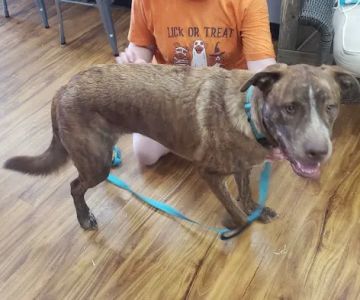Understanding Your Pet’s Nutritional Needs
As a pet parent, ensuring your furry friend gets the proper nutrition is crucial for their overall health and well-being. I've always been fascinated by how much a balanced diet can impact a pet's life. After all, much like humans, pets need the right fuel to keep their energy levels up, maintain healthy skin and coats, and thrive throughout their lives. But how do you really know what your pet needs in terms of nutrition? Let’s explore this topic and delve into understanding pet nutrition in a way that’s simple yet informative.
What Goes Into a Balanced Pet Diet?
When I first got my dog, Daisy, I was bombarded with different types of pet food, from dry kibble to raw food diets. It was overwhelming, and I wasn't sure where to start. It wasn't until I took the time to educate myself that I realized the importance of a balanced diet. Just like us, pets need a mix of essential nutrients that come from various food sources.
Protein, fat, carbohydrates, vitamins, and minerals—these are the core components that make up a pet's diet. Let’s break it down:
- Protein: Dogs and cats are primarily carnivores, so they require a higher amount of protein to fuel their muscles and body functions. High-quality meat is an excellent source of protein.
- Fats: Fats are essential for energy and to keep your pet's coat shiny and healthy. Omega-3 and Omega-6 fatty acids are particularly beneficial for overall wellness.
- Carbohydrates: While not a necessity for some pets, carbs can provide a good source of fiber for digestive health. Whole grains, vegetables, and fruits can be great carbohydrate sources.
- Vitamins and Minerals: Vitamins like A, D, E, and K, as well as minerals like calcium and phosphorus, play a key role in bone health, immune function, and skin health.
Feeding Different Types of Pets: Dogs vs. Cats
Understanding the nutritional needs of dogs and cats can be a little tricky because each species has its own unique dietary requirements. Daisy, for example, thrives on a high-protein diet, but she can handle grains in her food too. On the other hand, my cat, Whiskers, has a very different approach to food, requiring a diet that's more protein-focused with minimal carbohydrates.
Let’s take a closer look at what dogs and cats need:
Dogs’ Nutritional Needs
Dogs are omnivores, which means they can eat a variety of foods, from meat to vegetables. However, they still require a significant amount of protein to support their muscles and general health. If you’re buying dog food, make sure meat (like chicken, beef, or lamb) is one of the first ingredients listed on the label.
Cats’ Nutritional Needs
Cats, on the other hand, are obligate carnivores, which means they must consume animal-based proteins to meet their nutritional needs. Unlike dogs, cats cannot process certain nutrients from plants, so their food should be primarily meat-based. Look for high-protein foods that contain minimal fillers like corn or soy, which offer little nutritional benefit to cats.
Understanding Pet Food Labels
Pet food labels can be incredibly helpful in understanding what your pet is eating. But let’s face it, they can also be pretty confusing! Here’s what you should pay attention to when reading the label on your pet’s food:
- Ingredients List: The first few ingredients should be high-quality protein sources. Look for named meats like chicken, turkey, or beef, rather than generic terms like "meat" or "poultry meal."
- Guaranteed Analysis: This section provides the percentages of key nutrients like protein, fat, and fiber. Make sure your pet’s food has the right balance of these essential nutrients.
- AAFCO Statement: The Association of American Feed Control Officials (AAFCO) provides guidelines for pet food safety and nutrition. Check for a statement that the food meets AAFCO standards for your pet’s life stage (puppy, adult, senior).
Common Pet Nutrition Issues and How to Avoid Them
Throughout my years of pet ownership, I’ve encountered a few common nutrition-related issues. Some of these can be prevented by choosing the right food and by paying attention to your pet’s needs.
Obesity
One of the biggest concerns for many pet owners is obesity. It can lead to joint problems, diabetes, and decreased life expectancy. When Daisy gained a bit of weight, I realized that I wasn’t measuring her food properly. Overfeeding is a common mistake, especially with treats. Portion control and regular exercise are key to maintaining a healthy weight for your pet.
Food Allergies and Sensitivities
Some pets have food allergies or sensitivities, which can lead to skin issues, digestive upset, or ear infections. Daisy has a mild chicken sensitivity, so I switched her to a diet that included lamb and rice. If you notice that your pet is scratching excessively or having digestive problems, it may be worth consulting with your vet to see if food allergies are the cause.
Dental Health
Believe it or not, what your pet eats can impact their dental health. Feeding your pet crunchy kibble can help reduce tartar build-up, but it’s also important to provide dental chews and regular teeth brushing to prevent gum disease. My vet recommended a special dental diet for Daisy, which I now use to help keep her teeth clean.
Making the Right Food Choices for Your Pet
Choosing the right food for your pet is an ongoing process that involves trial and error. It’s essential to monitor their health and adjust their diet based on changes in their age, weight, or activity level. If you’re ever unsure, don’t hesitate to reach out to your vet for personalized recommendations.
When I started paying more attention to what Daisy was eating, I saw a significant improvement in her coat, energy levels, and overall health. It’s amazing how much of a difference proper nutrition can make in a pet’s life.
So, as a responsible pet owner, understanding and providing the right nutrition is one of the most impactful ways to ensure your pet lives a long, healthy, and happy life. Start with the basics, and don’t be afraid to consult with a vet to fine-tune your pet’s diet. After all, they rely on us to take care of their nutritional needs!












